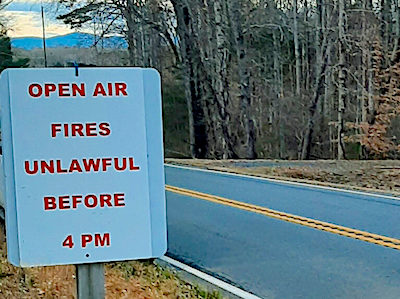
~ Press release issued by Virginia Department of Forestry
Virginia’s 4 PM Burning Law is in effect from February 15 through April 30 each year. It is important to note that some localities may have even more restrictive regulations on outdoor burning than the state’s 4 PM Burning Law. All burners are encouraged to check with their locality before starting any outdoor burning.
Learn about any current burn bans, view VDOF’s Burn Ban Map.
The 4 PM Burning Law bans open-air burning prior to 4 p.m. if the fire is within 300 feet of the woods or dry grass which could carry fire to the woods. Burning is allowed between 4 p.m. and midnight as long as the burner takes proper precautions and attends the fire at all times.
It is critical that burners take precautions before using fire, as there may be legal and financial implications. Even if a person takes all proper precautions and obtains any locally required permits, whoever started the fire is responsible for suppressions costs should the fire escape. Violation of the 4 PM Burning Law is a Class 3 misdemeanor with a fine of not more than $500.
Reason for the 4 PM Burning Law
Debris burning is the number one cause of wildfires, closely followed by intentionally set or “arson” fires. The 4 PM Burning Law was adopted during the 1940s to reduce the number of wildfires which occurred each spring, when Virginia has traditionally seen an increased number of fires.
Fires are more likely during late winter and early spring because winds are usually elevated, the relative humidity is lower, and the fuels on the forest floor are extremely dry, having “cured” all winter without the shade of tree leaves. After 4 p.m., winds usually calm down and the relative humidity levels rise, both of which reduce the potential for a debris fire or any outdoor open-air fire to escape.
Open-Air Burning
The 4 PM Burning Law applies to open-air burning, which means any outdoor fire that is not covered and/or contained within non-flammable barriers. For example, a typical campfire is considered an open-air fire. However, an open-air fire MAY be acceptable if it meets the following criteria: it is completely contained within a ring of rocks, cinderblocks, metal ring, or a similar device and is covered by a ¼ inch or smaller metal screen.
If these criteria are met, the fire still must be attended at all times, and all flammable material should be cleared from a 20-foot area around the fire. Campers must also have ready access to water, rake and shovel.
Fires built in commercially-available chimineas or fire pits with a ¼-inch or smaller metal screen are not considered open-air fires and are therefore legal, IF they are in good condition to prevent the spread of fire to surrounding areas. Check with local authorities and/or VDOF with any concerns or questions.
Exemptions to the 4 PM Burning Law
This law does not apply to charcoal or gas-fired barbeque grills. Users are still encouraged to take proper care and precaution by clearing all flammable material from around the grill, and stay with it until it is completely extinguished or turned off.
If burning operations are greater than 300 feet from the woods or flammable grass/vegetation that would allow the fire to spread to the woods, the 4 PM Burning Law does not apply. Otherwise, there are few exceptions to the 4 PM Burning Law.
However, Certified Prescribed Burn Managers can apply for exemption permits to complete specific types of burning during the restricted period.
Read the detailed Code of Virginia laws regarding burning.
Vineyards and orchard owners are allowed to set fires in an attempt to protect their crops from damaging frost. Read more about the specifics of this exemption in the Virginia’s 4PM Burning Law Amended for Orchard and Vineyard Growers.
•••
RELATED ARTICLES
USDA Joint Chiefs’ funding awarded to national forests for habitat restoration
Shenandoah National Park releases Old Rag day-use tickets starting Feb. 1
Virginia State Parks Youth Conservation Corps accepting applications
Forest Service closing seasonal recreation sites and roads for winter
Shenandoah National Park announces changes to fees following public comment
Land Trust of Virginia expands to Page County with Weaver Hollow Conservation Easement



Be the first to comment